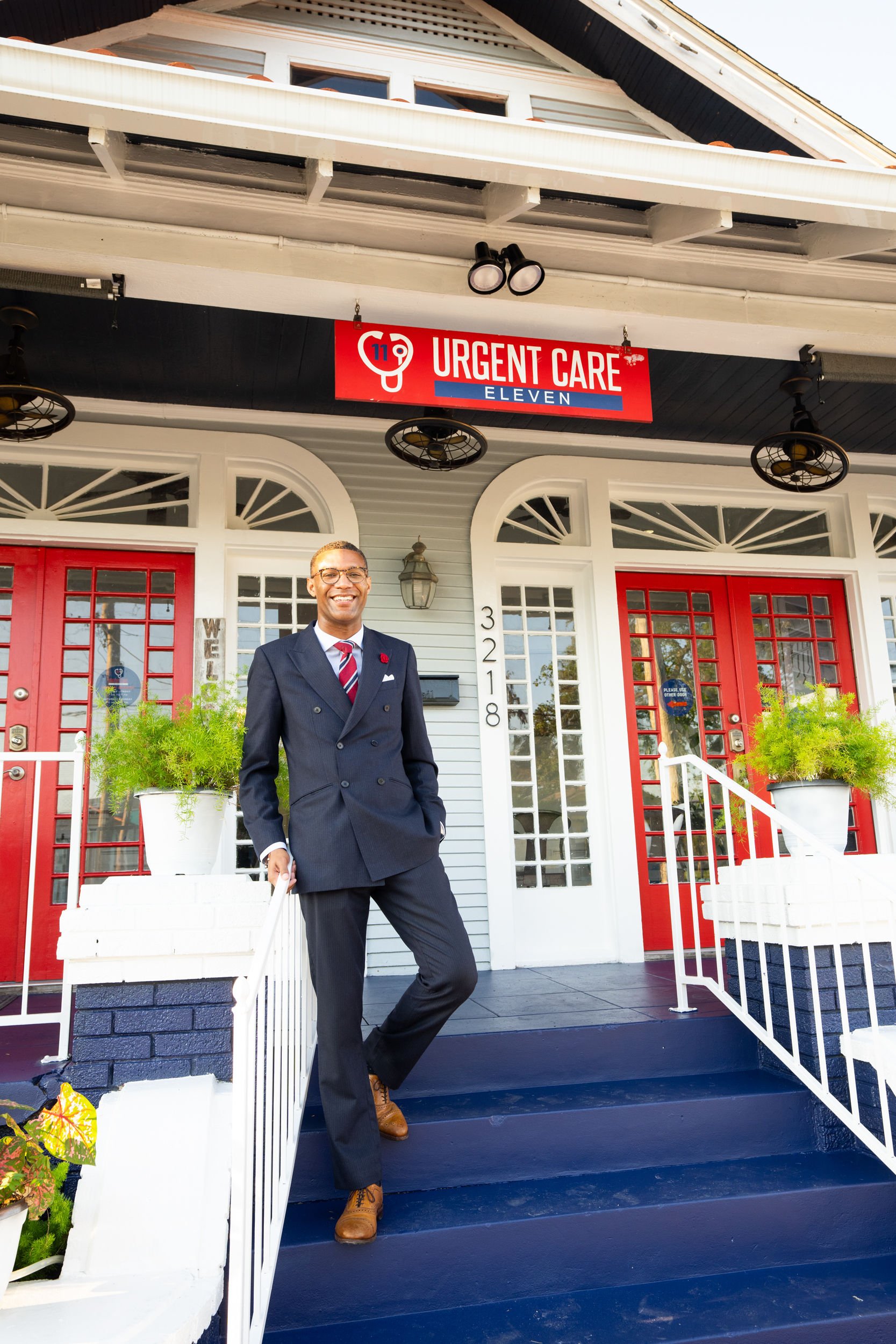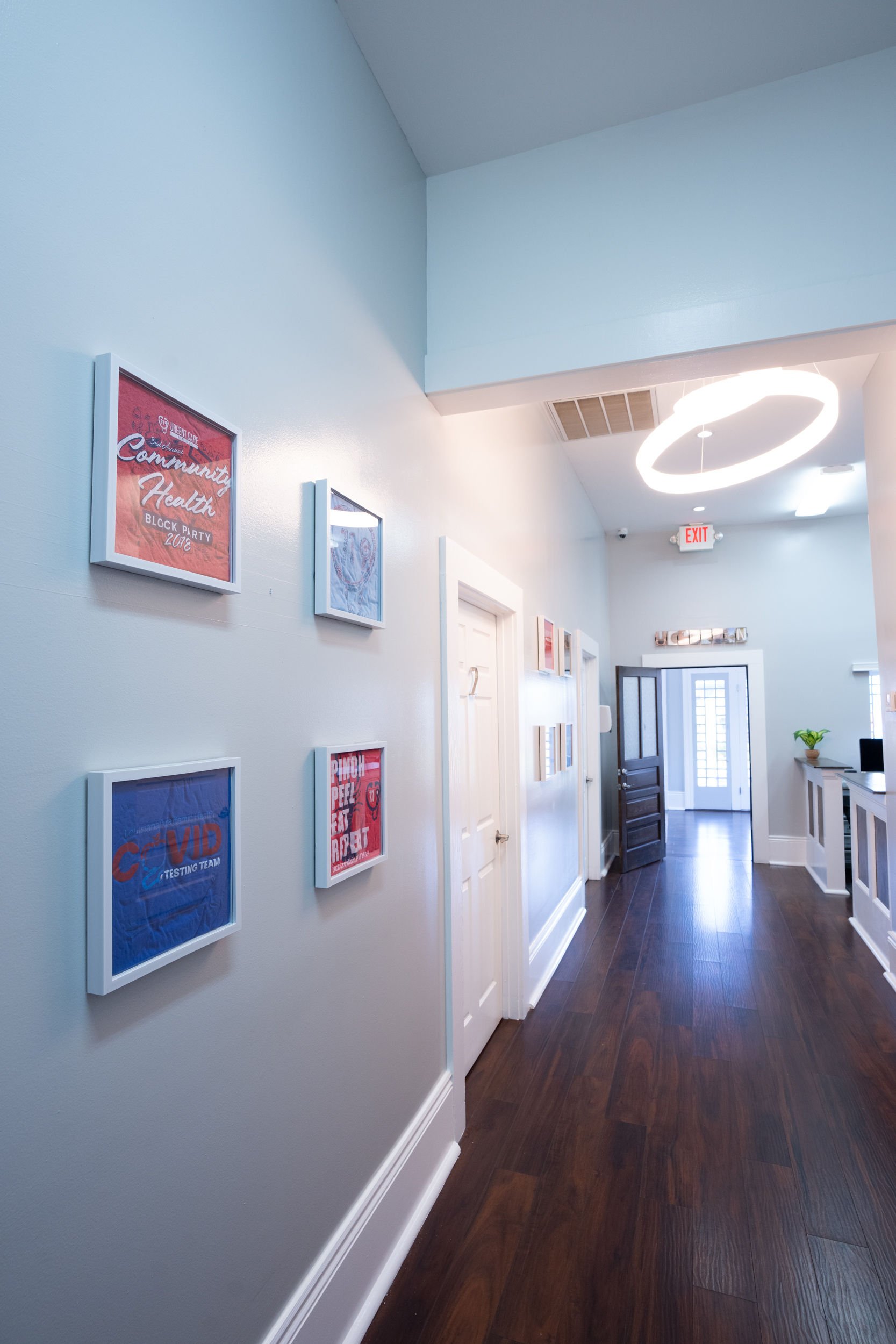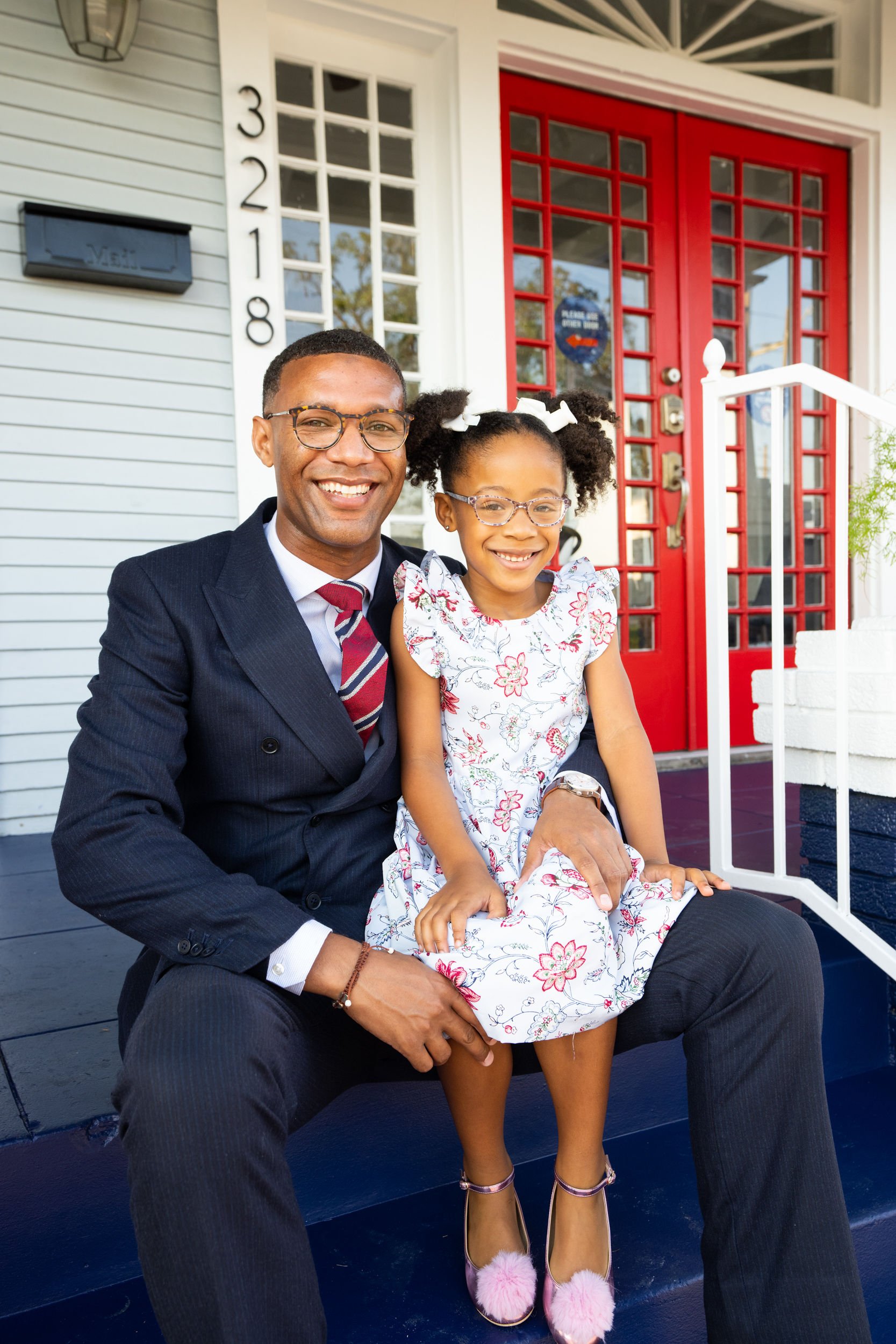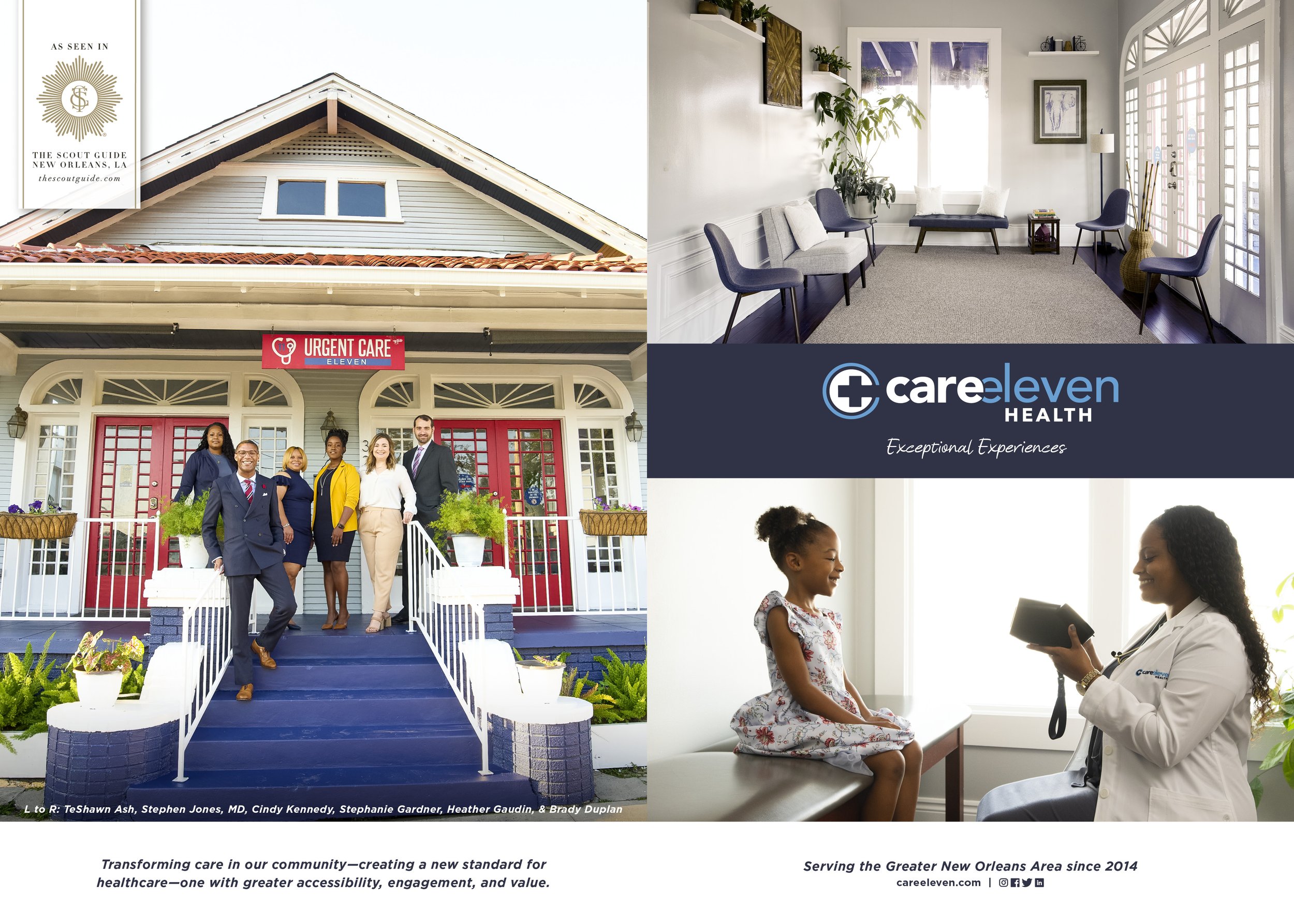More than Medicine: An Inspiring Interview with Dr. Stephen Jones of Care Eleven Health

It is my privilege to tell the stories of New Orleans’ local business owners, and none more so than Dr. Stephen Jones, founder and CEO of Care Eleven Health. Dr. Jones is humble and affable, yet with a keen eye to solve some of our city’s toughest challenges. Loyal Scout Guide readers know that I am seldom at a loss for words, but a recent interview with Dr. Jones left me speechless, awestruck by the impactful work he is doing for our community in medicine and specifically in New Orleans schools. This interview will leave you feeling inspired, hopeful, and racking your brain for ways to partner with Dr. Jones on his next initiatives. Here’s our conversation:
Let’s start with you. How did you decide to become a doctor?
I like to tell people I became a doctor by accident. I don’t have any doctors in my family, never really understood and appreciated the medical field, but was fortunate enough to land in the right spot. The right spot for me was Xavier University here in New Orleans which has the highest number of pre-med students go on to medical school of any school in the country. I decided to major in chemistry—just picking a major like kids do going into college—and my advisor at the time said, “Well if you’re going to do chemistry, you might as well do chemistry pre-med,” and I said, “Sure, no problem.” (laughs) The summer of my freshman year, I had the opportunity to rotate at a physician’s office—a fellow Xavier grad—and fell in love with medicine. I went to medical school in Nashville at a little school called Meharry Medical College, it’s one of three HBCU medical schools in the country, and from Meharry came back to New Orleans to do my Family Medicine Fellowship at LSU.

How did you start Care Eleven Health?
After my first couple of years practicing medicine, I decided I could build my own niche. I loved urgent care and emergency medicine. I looked at where in New Orleans we needed this type of care and opened our first clinic in the Bywater neighborhood. Our growth is still surreal to me—I remember starting out and working the front desk; I remember seeing only two patients a day; I remember opening the clinic, sweeping the floors, mopping, taking out the trash, drawing my own injections and doing my own X-rays. And now—boom—we have 12 clinics.
A huge part of Care Eleven Health is your clinics in schools. How did that come about?
Our work in schools, just like medicine, is a passion project for me. When I was a kid, I didn’t know I loved medicine, but I knew I loved schools, and I knew I loved schools because my mother was a teacher, my aunts were teachers. I was the kid running the halls at 8:00 at night waiting for my mom to finish grading papers. So I grew up knowing the importance of education and what education means for communities. If you’re a teacher, in any community but especially in a community that is in a resource desert, a medical desert, you are everything: You are the students’ parent, their counselor, their food source. Sometimes I remember taking kids home with us when they didn’t have anywhere to sleep that night. It’s such a huge lift on educators who, in my opinion, have been and continue to be underpaid and underappreciated for the type of impact they have on kids’ lives. All of that laid the foundation, so when a school network called and asked, “Would you be interested in opening a clinic in our school?” I said yes.

Was there a blueprint for how to build a clinic in a school? How did you figure out what that should look like?
I essentially took everything I learned from the clinical space and we built the urgent care model in the school. But what surprises many people is these kids have never seen medical providers before. Many haven’t had immunizations or hearing and vision screenings. I tell folks all the time: The impact wasn’t the medicine; we’re not doing medicine, we’re doing health, we’re doing wellness. So now we’re a school network management organization where we build the clinics, provide the services (hearing and vision screening, wellness, pre-employment screening, workers’ comp), and we have the ability to partner with community resources so any gap we find in medicine, we help fill it.
Was the school clinic successful right away?
It was such a powerful product that by the end of the first year, that same school network came back and said, “Can you do this in all our schools?” So now we have 10 school clinics that take care of 25 schools throughout New Orleans and Baton Rouge, and we have partnered with the three largest charter networks in the city to take care of 22,000-23,000 students, faculty, and staff throughout New Orleans. So it’s grown into something that’s been extremely impactful.
I am speechless just thinking of the scale and logistics that must require.
The logistics can be a challenge, but the fit is seamless. Schools say, “We need this,” and we say, “How can we get it?” or “We can provide it.”

What is your goal for the school clinics?
We want to be the entity that focuses on everything medicine-based so the schools can get back to doing what they were designed to do, which is educate kids. We can’t fill every social gap, but we can knock out the medicine piece, and there’s a lot of medicine that’s required.
The simplest description of my job is I’m a guy who fills holes in medicine. That’s it. Whether we’re in communities or in schools, we find holes and we fill them. Sometimes it’s more difficult than others, and then other times, we have amazing community partners.

You often talk about the importance of community partnerships. Can you give an example?
KREWE, the glasses company, has a foundation, and every kid in our high schools who fails their vision screening gets to pick from a selection of $500 KREWE frames. We put the prescription in the frames and the kid gets a brand new pair of glasses.
The value of community medicine is its integration with community partners. A lot of us want to do great work, we just maybe don’t know how to incorporate one side or the other. That’s probably the most difficult part, but when it comes together, it’s special.

What are your goals for the future?
One of our goals for this year is to continue to cultivate our community partnerships, focusing on how we can continue to add more value for the people we serve.
I try to keep things in small bites, easy to digest. We appreciate that our work is impactful, we pride ourselves on getting it right, but there are still so many things to do. In these resource deserts, they’re all in need of the same things: banks, medicine, schools, libraries, high-value food. I’m not wise enough to fix every hole, but we do hope to fix the holes in the medicine space. We would love to continue to uptick that level of service and continue to cultivate those community partners to support us and support the mission to get these communities the things they need.
So, TSG readers, how can you support this exceptional local business? Spread the word about the incredible work Care Eleven Health is doing. Do you own a business or know someone who could be an effective community partner? Let’s work together to connect Dr. Jones with likeminded people to create further meaningful change in our great city.





